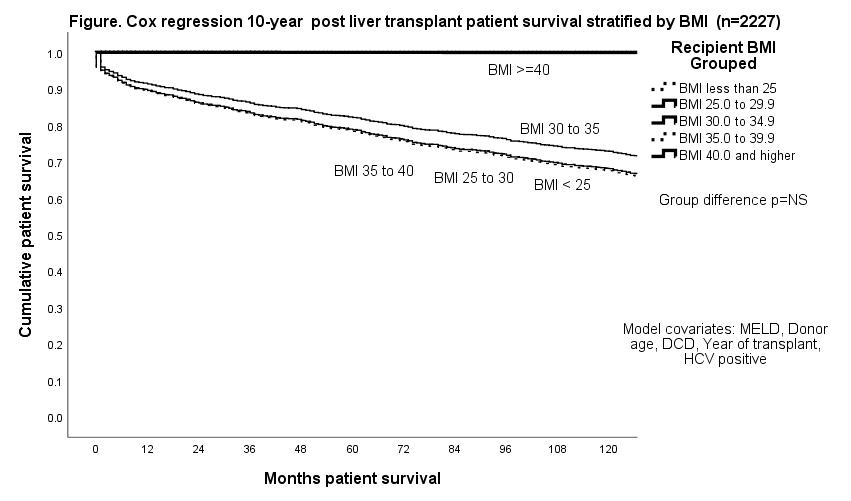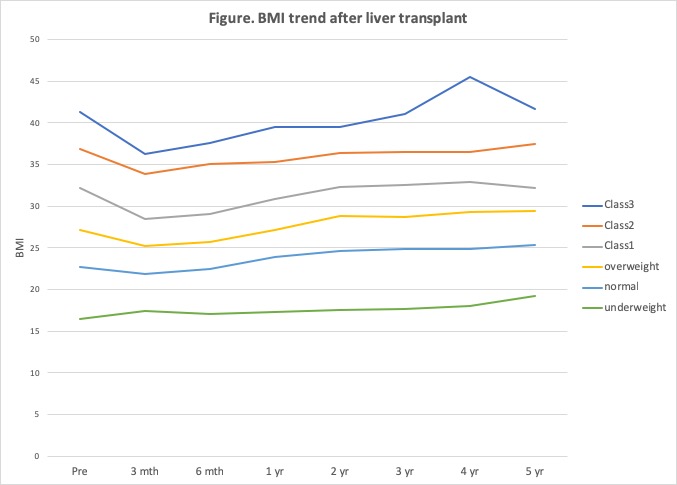Liver Transplantation in Obese Recipients: Post-Transplant Weight Gain and Outcomes
1Transplant Division, Department of Surgery, Indiana University School of Medicine, Indianapolis, IN, 2Transplant Hepatology, Division of Gastroenterology, Indiana University School of Medicine, Indianapolis, IN
Meeting: 2020 American Transplant Congress
Abstract number: C-168
Keywords: Liver transplantation, Obesity, Outcome, Weight
Session Information
Session Name: Poster Session C: Liver: Recipient Selection
Session Type: Poster Session
Date: Saturday, May 30, 2020
Session Time: 3:15pm-4:00pm
 Presentation Time: 3:30pm-4:00pm
Presentation Time: 3:30pm-4:00pm
Location: Virtual
*Purpose: Non-alcoholic fatty liver disease is now the most common cause of end-stage liver disease necessitating orthotopic liver transplantation (OLT) in the United States. Several studies have reported conflicting results for the impact of severe obesity on outcomes of OLT. The purpose of this study is to assess the impact of BMI on outcomes after OLT and follow up post-transplant change in BMI.
*Methods: All adult OLTs performed between July 2001 and December 2018 were reviewed. Retrospective analysis of patient data from the transplant center database was conducted.The data were collected retrospectively from donor and recipient charts. Based on WHO classification, BMI of recipients are subdivided into 5 categories: underweight and normal, overweight, class 1 obese, class 2 obese, and class 3 obese (<24.9; 25‐29.9; 30‐34.9; 35‐39.9; ≥40 kg/m2, respectively). Survival outcomes were compared between BMI groups. Post-transplant BMI were followed up in a sub-group of patients receiving OLT from January 2008 to December 2018.
*Results: Among 2227 patients in the analytic cohort (27% were underweight and normal, 34% were overweight, 26% were in class 1 obese, 12% were in class 2 obese, and 1% were in class 3 obese. By Cox regression, there was no significant difference in patient survival at 10-years. The BMI >40 group had length of stay of 13 days, compared to 10 days for all other groups (p=0.07). The BMI follow up data showed that BMI of all groups except of underweight group declined in the 3 month postoperatively, but high BMI recipients, in particular the patients with BMI >40 regained weight and reached to pre-transplant BMI within 3 years follow-up.
*Conclusions: This study showed that severe obesity in ESLD patients is not associated with higher post-transplantation mortality. Obesity, including morbid obesity should not be considered to be a contraindication to liver transplantation in the absence of other contraindications. Post-transplant weight gain in these patients indicates the need for intervention.
To cite this abstract in AMA style:
Soma D, Park Y, Mihaylov P, Ekser B, Ghabril MS, Lacerda MA, Chalasani N, Mangus RS, Kubal CA. Liver Transplantation in Obese Recipients: Post-Transplant Weight Gain and Outcomes [abstract]. Am J Transplant. 2020; 20 (suppl 3). https://atcmeetingabstracts.com/abstract/liver-transplantation-in-obese-recipients-post-transplant-weight-gain-and-outcomes/. Accessed February 17, 2026.« Back to 2020 American Transplant Congress


